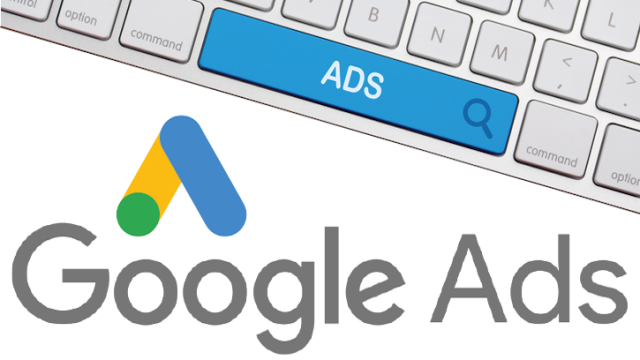I Will Use Google Ads to Make Money for Your Business!
Google Ads (formerly AdWords) is used by 98% of businesses worldwide that do pay-per-click (PPC) advertising, because it reaches people who are searching for what they're selling - with a mean conversion rate of 6.06% and ROI of 200% in 2024.
As a business owner, your goal is to make sales, not maximize website traffic. And a basic rule of sales is that you want to attract people who are ready, willing and able to buy - not "tire kickers".
Google Ads will do that. But you don't have time to acquire and every day use the Google Ads skills needed to deliver successful ad campaigns while running your business. (How much spare time do you have right now?)
That's where I come in. You run and grow your business, I'll run your Google Ads, and we'll both make money.
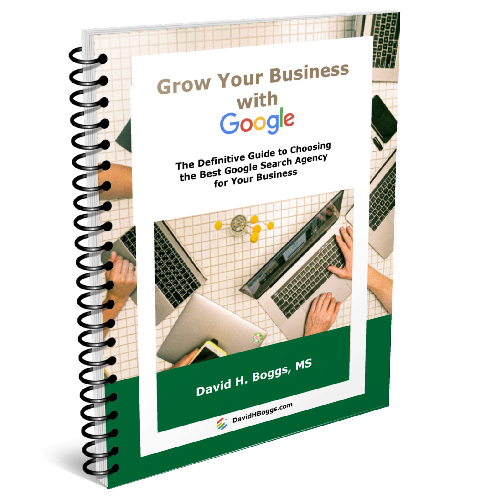 FREE Guide:
FREE Guide:
Grow Your Business with Google: The Definitive Guide to Choosing the Best Google Search Agency for Your Business
- How Google Ads and SEO work
- Why you need to work with a professional agency
- How to find the best Google Search agency for your business
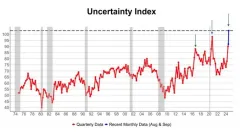 Are uncertainties about tariffs, inflation and immigration worrisome for you? They are for me. See my regularly updated Google Ads to Sustain Business in Challenging Economic Times page for information and numbers on the advantages of keeping your Google Ads running during bad times to stay in business, continue to get new customers into your pipeline, and get ahead of competitors in the next upturn. In tough times, smart advertisers go where their audiences are, and more are at Google than anywhere else.
Are uncertainties about tariffs, inflation and immigration worrisome for you? They are for me. See my regularly updated Google Ads to Sustain Business in Challenging Economic Times page for information and numbers on the advantages of keeping your Google Ads running during bad times to stay in business, continue to get new customers into your pipeline, and get ahead of competitors in the next upturn. In tough times, smart advertisers go where their audiences are, and more are at Google than anywhere else.
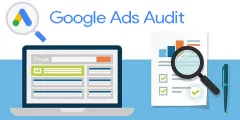 How are your Google Ads doing? Schedule an expert audit of your Ads account by a certified Google Advertising Professional and get specific, actionable recommendations for changes that will get you more conversions at lower ad spend while generating higher quality leads!
How are your Google Ads doing? Schedule an expert audit of your Ads account by a certified Google Advertising Professional and get specific, actionable recommendations for changes that will get you more conversions at lower ad spend while generating higher quality leads!
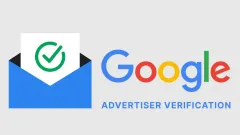 Has Google paused your Ads, given you a deadline to get verified, or notified you that you're “eligible” for advertiser verification? Google says it's doing this to provide a “safe and trustworthy ad ecosystem for users” which is a noble aim. But don't let Google stop your Ads! Fight back! You can get results from Google Ads faster than from any other channel. I'll work with Google to get you verified. Read more here.
Has Google paused your Ads, given you a deadline to get verified, or notified you that you're “eligible” for advertiser verification? Google says it's doing this to provide a “safe and trustworthy ad ecosystem for users” which is a noble aim. But don't let Google stop your Ads! Fight back! You can get results from Google Ads faster than from any other channel. I'll work with Google to get you verified. Read more here.
Benefits of my managing your Google Ads
Once you've explained to me what your business objectives are, with Google Ads I'll be able to target a ready-to-buy audience by everything from the keywords they use, to their physical location, to the time of day and the kind of device they're searching from. I will be able to understand their intent, and adjust marketing on-the-fly to maximize conversions.
And you'll get the most mileage out of your marketing budget because I'll be able to switch out ad collateral, A/B test content and start or stop keywords, ads and campaigns to keep traffic and conversions flowing.
 I'll control your ad spend, within the Google click budget you set. Most small and medium businesses have limited marketing budgets. With Google Ads, there is no minimum spending requirement. I'll track and report your ad spend in detail. You'll pay Google only when someone clicks on your ad. You won't spend money on ad views by users who don't engage with your ad and so don't buy.
I'll control your ad spend, within the Google click budget you set. Most small and medium businesses have limited marketing budgets. With Google Ads, there is no minimum spending requirement. I'll track and report your ad spend in detail. You'll pay Google only when someone clicks on your ad. You won't spend money on ad views by users who don't engage with your ad and so don't buy.
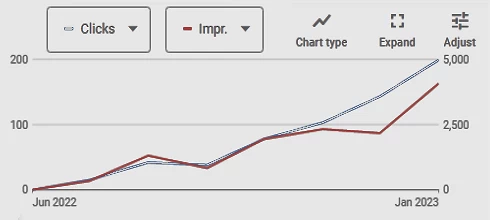 I'll get your ads running fast:Once your Google Ads campaign is up and running, you pay only (1) click charges to Google for clickthroughs to your website from your Google ads, and (2) my modest, flat monthly campaign management fee for ad creative, ongoing campaign management, and reporting.
I'll get your ads running fast:Once your Google Ads campaign is up and running, you pay only (1) click charges to Google for clickthroughs to your website from your Google ads, and (2) my modest, flat monthly campaign management fee for ad creative, ongoing campaign management, and reporting.
Ads Measurement and Conversion Tracking
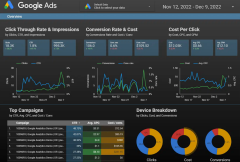 Your Google Ads campaign will then start to produce data, and I'll begin measuring its performance using advanced reports that will show you the impact on your business that the campaign is delivering. Google Ads data can be segmented in various ways as needed to see what's moving the needle on your business objectives: time, geography, landing page, search terms, comparisons with competitors' results. Conversion tracking reveals what customers do after clicking on your ads: viewing pages, downloading information, joining your email list, making a purchase. I'll provide easy-to-understand monthly reports on key, meaningful Google performance indicators - not “vanity metrics” (followers, likes, etc.).
Your Google Ads campaign will then start to produce data, and I'll begin measuring its performance using advanced reports that will show you the impact on your business that the campaign is delivering. Google Ads data can be segmented in various ways as needed to see what's moving the needle on your business objectives: time, geography, landing page, search terms, comparisons with competitors' results. Conversion tracking reveals what customers do after clicking on your ads: viewing pages, downloading information, joining your email list, making a purchase. I'll provide easy-to-understand monthly reports on key, meaningful Google performance indicators - not “vanity metrics” (followers, likes, etc.).
 Go here to find out about Advanced Google Ads Services: keyword match types, ad scheduling, bid adjustments, Search Network, Display Network, Location Targeting, Demographic Targeting!
Go here to find out about Advanced Google Ads Services: keyword match types, ad scheduling, bid adjustments, Search Network, Display Network, Location Targeting, Demographic Targeting!
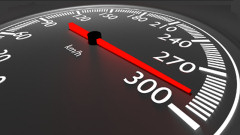 Need Google Ads up and working RIGHT NOW? Take a look at my Rapid Google Ads Campaign: site audit, 20 ads live online in one week, location targeting, flat monthly campaign management fee, no markup on clicks, no long-term contract, money-back guarantee!
Need Google Ads up and working RIGHT NOW? Take a look at my Rapid Google Ads Campaign: site audit, 20 ads live online in one week, location targeting, flat monthly campaign management fee, no markup on clicks, no long-term contract, money-back guarantee!
Some of My Blog Posts About Google Search Ads
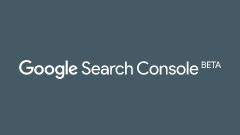 How to use the URL Inspection Tool to find out which of your Web pages Google has indexed and which it hasn't, and why
How to use the URL Inspection Tool to find out which of your Web pages Google has indexed and which it hasn't, and why
Any Web page that Google hasn't indexed is at a big disadvantage - because Google won't be sending any organic search traffic there regardless of how well your content matches phrases your potential customers are using to search for stuff like yours.
 57% of US smartphone owners have done “near me” searches when shopping, food is #1 category
57% of US smartphone owners have done “near me” searches when shopping, food is #1 category
93% of those who have done "near me" searches said they are "very likely" (60%) or "likely" (33%) to click on one of the top 3 search returns.
 How to use Xenu's Link Sleuth to find image files that are making your website slow to load
How to use Xenu's Link Sleuth to find image files that are making your website slow to load
Too many, too large image files are the #1 cause of the long page-loading times which Google so dislikes - especially for smartphone users. Xenu's Link Sleuth provides a quick and easy way of finding your largest image files: file size, page, link text, and URLs linking to and from that page.
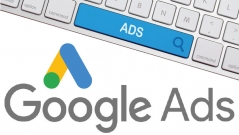 Google Ads spend grew 15% in 3Q2022, stabilizing near pre-COVID level
Google Ads spend grew 15% in 3Q2022, stabilizing near pre-COVID level
In contrast, 3Q2022 revenues of Meta - which faces increasing competition from TikTok and other social-media platforms - were down from 3Q2021.
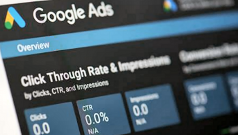 Why you should invest in paid search ads now
Why you should invest in paid search ads now
Paid search produces the greatest Return on Advertising Spend (ROAS) across media per dollar invested in US.
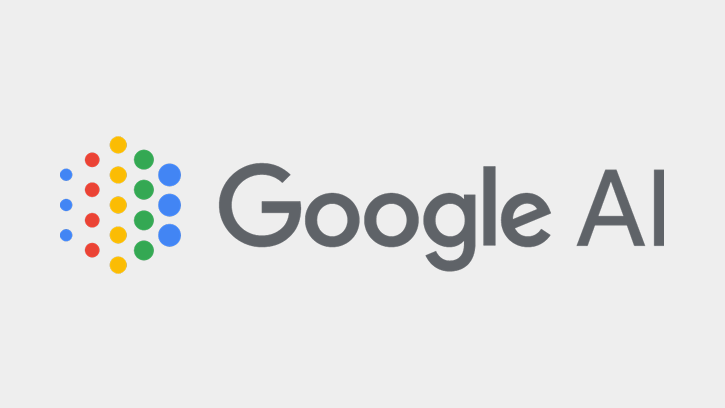 Google announces clustering algorithm designed to reveal group characteristics while maintaining individual privacy
Google announces clustering algorithm designed to reveal group characteristics while maintaining individual privacy
'Differentially Private Clustering' could enable organizations to learn insights from group data while protecting individual data privacy.
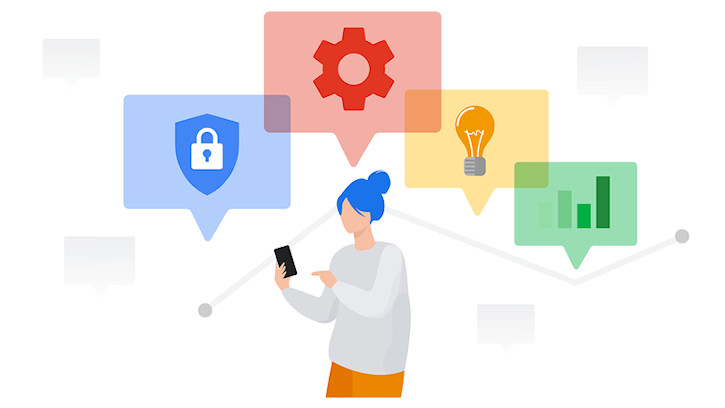 Data-Driven Attribution (DDA) to replace last click as default in Google Ads
Data-Driven Attribution (DDA) to replace last click as default in Google Ads
Change is likely intended to compensate in part for data that will be lost to advertisers when Chrome no longer supports 3rd-party cookies.
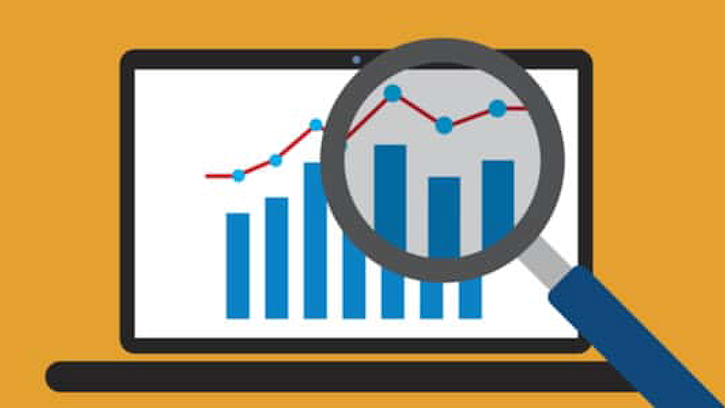 Google releases Enhanced Conversions feature in beta for Google Ads using first-party data
Google releases Enhanced Conversions feature in beta for Google Ads using first-party data
Secure hashing algorithm collects first-party conversion data which are then matched with signed-in Google accounts.
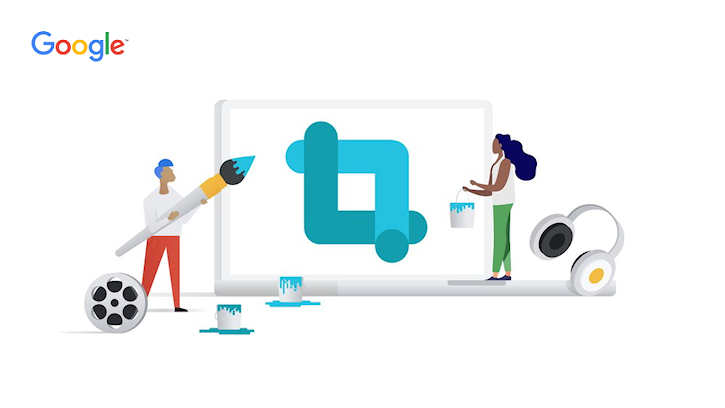 Google introduces Ads Creative Studio one-stop video, display and audio ad builder
Google introduces Ads Creative Studio one-stop video, display and audio ad builder
Ads Creative Studio includes Director Mix and Audio Mixer plus dynamic and HTML5 tools.
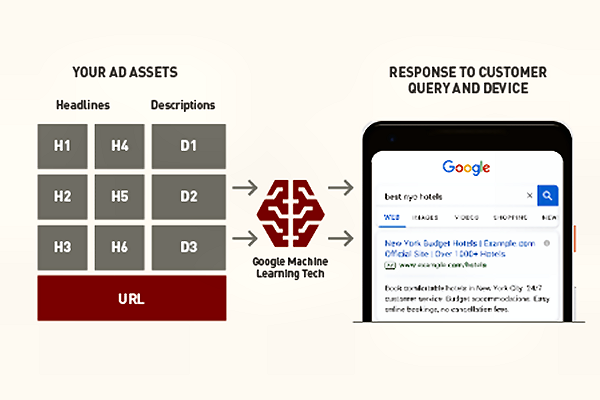 Best practices for responsive search ads now the default Google Ads format
Best practices for responsive search ads now the default Google Ads format
Responsive Search Ads are now the default format as Google continues to streamline ad system
 Use Google Display Ads to Reach New Customers! Display Ads powered by machine learning serve visually engaging ads near related content to targeted audiences on YouTube, Gmail and the 35 million websites and apps on the Google Display Network. Check it out!
Use Google Display Ads to Reach New Customers! Display Ads powered by machine learning serve visually engaging ads near related content to targeted audiences on YouTube, Gmail and the 35 million websites and apps on the Google Display Network. Check it out!
Questions About Google Ads Answered
Q: How do I write successful ad copy for Google Ads?
A:
Write as if you were having a conversation with a friend. Don't worry about rules of grammar. Don't use big words. Don't use foreign words. Use WORD or other software to keep your copy at 11-year-old level, regardless of how smart your target audience may be. Get immediately to the #1 benefit without fooling around with laying preliminary groundwork, etc. Include a call to action with a compelling offer and tell the user how to get it. Don't leave anything open to interpretation.
Q: Can you use a different domain for an ad extension on a Google search ad?
A:
Google allows exceptions for sitelinks to point to your Facebook, YouTube, etc. account if the link text accurately represents to users what's at the URL.
Q: Why am I not getting better results from Google Ads on my website? What checkpoints need to be checked?
A:
You may need to increase your budget. Low impression share would be a clue. And always remain on top of negative keywords, based on search terms for which Google is displaying your ads. Avoid paying for clicks that don't convert.
Q: Should you use your own company name as a keyword on a Google Ads campaign?
A:
Depends on (1) how well-known your company is, (2) what Google will charge you for the clicks and (3) your objective in getting traffic on the name. If your company is relatively unknown, clicks are cheap and you're looking to build name recognition, sure, pay for clicks. If your company name is very well known - Chevrolet, Verizon, etc. - it would be a waste of money as your website will come up at the top of organic search returns anyway.
Q: If you run Google Ads of 20k PKR for your website, how many visitors will you get?
A:
How many clicks you will get for that amount of money depends on your average CPC which in turn depends on the keywords you buy, how much competition there is for them, how much your competitors are willing to spend to get a larger impression share and more clicks than you, and how Google rates the quality of your ads and landing pages vs. competitors'.
Q: Where should I use broad match phrases and exact keywords in Google Ads?
A:
Depends on how many conversions you're getting, what they're worth to you, and what you're paying for them. Also bear in mind that “exact match” in Google Ads is no longer truly “exact” - it's more like “pretty close match” vs. broad match which is more like “not entirely irrelevant.” While it's true that “smart bidding” works better with broad match, it's also in Google's interest for you to use broad match because it's guaranteed to produce more clicks (ad revenue for Google) than “exact.” If clicks on broad-match keywords are producing too many wasted clicks and too few conversions to be profitable, try “exact” and experiment with budget adjustments to try to attain profitability.
Q: How do I get the best results from Google search ads?
A:
With Google Ads - especially in a down economy when Google is seeing fewer clicks and has to increase CPCs to maintain ad revenue - you have to spend money to make money. Cost vs. value of conversions you're getting are key metrics for profitability.
Q: What is the relationship between pay-per-click (PPC) campaigns and organic search on Google?
A:
Google Ads and Google organic search complement each other. And they tend to draw different kinds of traffic. In my experience with service businesses, more users with intent to buy come from Google Ads, while organic search tends to produce more informational queries.
Q: What are the advantages and disadvantages of pay-per-click (PPC) advertising and search engine optimization (SEO) when it comes to gaining traffic and leads from Google?
A:
PPC has lower up-front cost and gets results much faster, but you have ongoing cost of paid ads. SEO has significant up-front cost and ongoing maintenance costs, but no charges for ads or media buy. Polls of marketers usually show they favor PPC over SEO which may mean that PPC is considered easier and/or requires less skill. And skill of people doing either PPC or SEO is a key variable.
Q: What are the disadvantages of using broad match keywords in your Google Ads account?
A:
With broad match keywords - especially in a down economy with companies cutting back on advertising - Google will show your ads on search queries that show little purchase intent and/or are done by people whose search history makes them unlikely prospects. Because to maintain advertising revenues, Google needs to keep the clicks flowing. You will pay for those non-converting clicks but get zero incremental sales and revenue. Be sure to watch your Search Terms report - incomplete as it is - and add to your negative keyword list any search terms that are irrelevant or reveal no purchase intent.
Q: What are the ethical implications of practicing search engine optimization or pay-per-click advertising without being certified in those fields by a professional association?
A:
There is no SEO or PPC organization whose certification I would trust to be meaningful, impartial or in the interest of clients. “Best Of” sites generally feature paid placements. SEO and PPC take place in the Wild West, and you need to consider each agency on its own merits. Length of time in business is a pretty good “knockout” attribute - no one becomes expert at PPC or SEO overnight.
Q: Does having no ads competition on Google increase the CPC due to high conversion rate? If competition is high, does it decrease the CPC rate?
A:
All else being equal, multiple bidders chasing clicks on the same keyword should drive CPC up for all. (And being the only one bidding on a keyword doesn't guarantee high conversion rate, as absence of competition may indicate low demand.)
Q: If I create a landing page in English and advertise it on Google Ads in non-English-speaking countries, will I be banned for circumventing systems policy?
A:
No. But I have to ask: why do you want to pay for clicks on ads by people who cannot understand them?
Q: What is the definition of CPI in Google AdWords?
A:
In Google Ads “CPI” means “cost per install” and is a pricing model for mobile app campaigns by which you pay each time a user installs your app on a device. You can set a “max CPI” or “target CPI”.
Q: What is the difference between organic and paid traffic from Google Adwords?
A:
ALL traffic to your website from Google Ads is “paid traffic”. You pay Google for every click from a Google Ads campaign. You pay nothing (to Google) for “organic” clicks that come from sources other than Google Ads.
Q: What are “conversions” and “goals” in AdWords, and how are they tracked?
A:
Google ads and Google Analytics are both in the mix when talking about “goals” and “conversions”. In Universal Analytics, generic conversion events were called “goals.” In GA4, they're called “conversions.” A generic conversion - Google terminology aside - is some event that you define as having value in your business model: an online sale, a mailing list signup, a white paper download, submission of a contact form, etc. Best way to track Google conversions is to integrate Google Analytics with Google Ads using auto-tagging. (See Google Support.)
Q: What is the minimum bid amount requirement on Google's ad network (AdWords) for negative keyword searches?
A:
Negative keywords are keywords on which you don't want clicks because, for example, the keyword is irrelevant to what you're selling so you'd be paying for non-converting clicks. So there would be no click budget associated with negative keywords.
Q: Are there any benefits from having a Google Ads campaign if you already have an optimized website for search engine optimization (SEO) purposes?
A:
I'm going to assume that you have a business website and are seeking either immediate sales or leads for future sales. Two things to consider when deciding whether or not to add Google Ads to pages optimized for Google organic search are:
- How well are these pages optimized? Do you have Page 1 positioning on all your important keywords? Or are there some holes in your SEO that Google Ads could profitably fill?
- Are your optimized pages attracting users with intent to buy? Because in organic search Google favors pages that provide the best answers to users' questions. And for that reason via SEO you will get many informational - vice transactional - queries. Users who click on Google Ads are more likely to be motivated by the need or wish to buy something, either immediately or at some time in the foreseeable future.
Q: What is the minimum bid amount requirement on Google's ad network (AdWords) for negative keyword searches?
A:
Negative keywords are keywords on which you don't want clicks because, for example, the keyword is irrelevant to what you're selling so you'd be paying for non-converting clicks. So there would be no click budget associated with negative keywords.
Q: What's the difference between broad match and exact match keywords in Google Search Ads?
A:
“Broad match” has always meant, and still means, for all practical purposes, inquiries that match by any possible stretch of Google's imagination the keyword being bid on. At one time “exact match” meant literally that: the query had to exactly match the keyword. But more recently, Google has introduced a degree of flexibility into the “exactness” so that ’exact match” is now really “pretty good match.” This makes it necessary for advertisers to pay attention to the Search Terms Report - which has itself been partially disabled - and create negative keywords as necessary to try to avoid non-converting clicks caused by inexact keyword match.
Q: Can I change the source code of a landing page while a Google Ads campaign is running for that landing page?
A:
Yes, you can, but unless you need to make changes to fix some kind of error, you should first get enough data (bounce rate, conversions, etc.) from the existing version to be able to assess its effectiveness.
Q: How long does it take for Google ads to start working?
A:
When submitted or edited, Google Ads are reviewed by a human somewhere, which introduces some delay. But unless rejected for policy violations, a new ad should go live within hours.
Q: It's hard to believe Google's main revenue comes from ads. Do those sponsored search results in Chrome and 10 second ads on YouTube cost that much?
A:
In 2022 Google took in US$224.47 BILLION in ad revenues. Yes, sponsored search ads do cost that much, and in 2022 98% of companies using pay-per-click ads used Google Ads.
Q: How do I create Google ads using another domain as a cover, but when clicked, it will redirect to my website?
A:
Yes, you can redirect the Google Ads landing page URL to a page on another domain, but Google considers that to be a “destination mismatch” which violates their advertising policies, and it will make them cross. Don't do it.
Q: What are the right questions to ask when analyzing Google Ads or Analytics data?
A:
1. What is a conversion costing me?
2. Is the value of a conversion great enough to provide the margin I need above its cost, in order to be profitable?
Q: What is the most important, heaviest weighted, factor in the Google Ads quality score?
A: Clickthrough rate. Because that's how Google gets paid. Relevance of keyword to ad and ad to landing page, and past campaign performance, are factors also. Getting good grades on those items should translate into higher clickthrough rates, more sales for you and more money for Google.
Q: How do you create perfectly targeted Google Ads?
A: Begin by creating a detailed profile of your “perfect customer,” then create and deliver ads accordingly.
Q: How do Google Ads know what someone has been wanting to buy?
A: From that individual's search history - pages visited, links clicked on - using machine learning to identify patterns.
Q: How long does it take for Google ads to start working?
A: When submitted or edited, Google Ads are reviewed by a human somewhere, which introduces some delay. But unless rejected for policy violations, a new ad should go live within hours.
Q: Are Google Ads and Google Display Ads certification the same? If not, then how do they differ?
A: They are different because they relate to different kinds of Google Ads campaigns. Current names of these certifications are Google Ads Search (text ad campaigns) and Google Ads Display (display ad campaigns).
Q: Why do our ads on Google not show daily (using Google Ads)?
A: Reason hinges on what you mean by "not show daily". Unless your click budget is sufficient to keep ads running 24/7, ads won't display during some parts of every day. When they display (or don't) depends on your Ad Delivery setting. With “Standard” delivery, Google will distribute your ad display evenly across 24 hours (unless your Ad Scheduling setting says otherwise). With “Accelerated Delivery"”, at the beginning of the day Google will turn your ads on and leave them on continuously until the daily, click budget is depleted, then turn them off until next day.
Q: What is the fastest) way to get a new business appear in Google listings?
A: Get someone knowledgeable to create a Google Ads campaign, initially set bidding strategy to Max Clicks.
Q: How do you determine if Google Ads is right for your business?
A: Google Ads works best when you have a product or service for which people are likely to search online to find when they need it right now. “24-hour plumber” is a classic example. A product/service no one has ever heard of likely won't do so well, as there will be few searches. In between, there are many products and services that Google Ads can pitch to people who are searching for a product, service or solution to some problem, at some point - researching, comparing alternatives, ready to buy - in the conversion funnel. Good choice of keywords, good ads and good landing pages will sell those folks too.
Q: Why is Google an advertising agency disguised as a search engine?
A: Google is both a search engine (with 90+% share of searches in both the US and Europe) - and an ad platform (with 75% share of global search ad spend) . It does both things very well - advertising just pays better.
Q: How is Google competing with TripAdvisor?
A: Google Business Profile and Google Reviews are killing TripAdvisor's Experiences and Dining product. Trying to stay competitive, TripAdvisor has been spending heavily on Google ads, so has to sell ad space on its own site to pay for that.
Q: Will increasing my daily budget with Google Ads improve my position in the search results?
A: Not necessarily. It may just increase the on-time of your ads (along with your spend). You need to look at your quality scores, and how your bids on individual keywords compare to bid for #1 position.
Q: How crucial is it for a new business to be listed in the top 5 on Google Search?
A: It's certainly desirable but unlikely for a new business's website to appear anytime soon in the top 5 results on meaningful keywords. You should begin to work diligently on SEO, but in the meantime to get immediate potentially profitable traffic, you can use Google Ads and be at the top of Page 1 same day.
Q: What is the minimum amount I need to spend in Google Ads to get good enough leads?
A: As with so many other aspects of Google search: it depends. $1000-$2000/month is commonly recommended. But a sufficient click budget is one large enough to get statistically reliable results from your campaign in a reasonable length of time. And that's a function of the number of keywords you plan to buy, the volume of clicks your ads get, and the cost per click of each. However, remember that Google Ads budgets are set on a daily basis, not monthly, and ads can be paused and unpaused at will. You can start small by collecting data using a relatively large daily budget and running the campaign on relatively few days - to get quicker/better results vs. running ads every day with a small daily budget.
Q: How do you analyze an ad?
A: There are ads, and there are ads. We want to measure the success of our ads in terms of results. The performance of ads that are designed to create awareness or build image is difficult to quantify - takes us into the realm of “views”, “likes”, etc. For that reason I prefer direct-response ads that make a specific offer to which people either respond or don't: download this report, join this list, contract for this service. That makes measurement simple, with no wiggle room. And in a digital world,we can swap a new ad in for an underperforming one in a matter of minutes.
Search Advertising with Google Ads - Resources
Google Ads Frequently Asked Questions by Google
All the basics, direct from Google
Google Ads Help System by Google
Index to the very comprehensive Google Ads help system, with links to video tutorials and the Help Community
Google Ads YouTube channel by Google
Dozens of Google Ads tutorial and informational videos on Google-owned YouTube
What is Google AdWords? by Wordstream
An independent explanation of how Google Ads (formerly AdWords) works by the search software developers at Wordstream
Contact me:
David H. Boggs, MSCopyright © 2025 David H. Boggs, MS | All Rights Reserved


 Google Ads (formerly AdWords) is
Google Ads (formerly AdWords) is 
